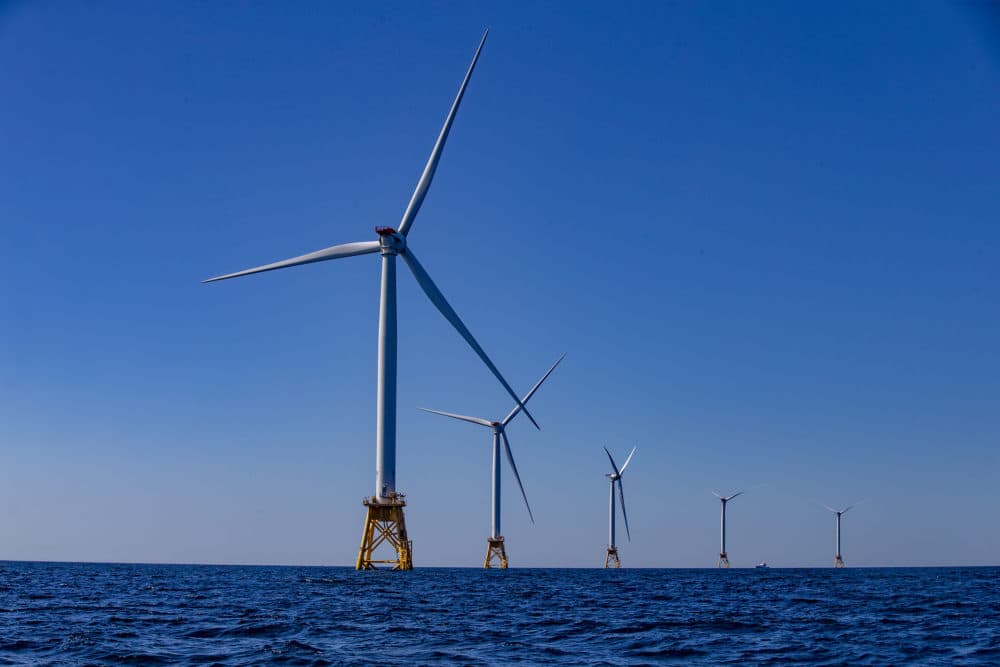Advertisement
Fishermen Challenge Federal Approval Of First Large-Scale Offshore Wind Project

A group representing commercial fishermen is asking the First Circuit U.S. Court of Appeals to review the federal government's decision to approve the country’s first large-scale offshore wind project, Vineyard Wind 1.
The Responsible Offshore Development Alliance — known by its acronym, RODA — says the government agencies in charge of assessing and approving offshore wind projects acted hastily and failed to consider how the 62-turbine project near Martha’s Vineyard would harm commercial fishermen.
“The government has a duty here to minimize interference with commercial fishing, with navigation, with the way that our fishing industry utilizes the ocean to provide food. And they didn't do that in this case,” says Annie Hawkins, executive director of RODA.
Hawkins says fishermen spent hundreds of hours testifying at public hearings and writing to federal agencies outlining their concerns about Vineyard Wind, but were largely ignored. RODA wants the courts to assess whether mistakes were made in the permitting process, before the federal government approves other wind projects lined up behind Vineyard Wind.
A spokesperson for the Bureau of Ocean Energy Management (BOEM), the main federal permitting agency within the U.S. Interior Department, declined to comment.
The petition alleges that "Departments of Interior, Commerce, and Army violated the Outer Continental Shelf Lands Act, National Environmental Policy Act, Clean Water Act, Administrative Procedure Act, Endangered Species Act, Marine Mammal Protection Act, and Merchant Marine Act of 1920” by greenlighting the Vineyard Wind project.
The petition is not an official complaint outlining the group’s concerns, Hawkins says. Rather, it asks the appellate court whether it would hear the case. If the court says yes, Hawkins says RODA will then file an official complaint; if the appellate judges say no, RODA will file suit in a different federal court.
“These are incredibly big, complicated projects with a lot of details that go into them, and overall, the quality of oversight and regulatory due diligence that we see for other types of industries and other large projects just wasn't completed here,” Hawkins says. “Hopefully in the future, we’re able to build offshore wind projects that are a lot more compatible with commercial fishing.”
RODA represents thousands of fishermen and associated fishing industry workers along the east coast, many of whom fear that offshore wind will spell the end of their ability to make a living from the ocean. According to the group, U.S. commercial fishermen caught 9.3 billion pounds of seafood valued at $5.5 billion in 2019.
The U.S. has some of the most highly regulated fisheries in the world, and many fishermen say they’ve already sacrificed a lot in the name of conservation.
“Yes, it's a huge ocean but why are we fighting for the same spot? We've been here forever," Peter Anthony of the New Bedford-based company, Eastern Fisheries, told WBUR earlier this year. "They're fertile fishing areas.”
Advertisement
Though fishermen like Anthony have a variety of concerns about offshore wind, some of the biggest include: that the turbines will disrupt ocean ecology and harm fisheries; that it will be difficult, or even dangerous, to navigate between the turbines, especially when the weather is bad; that more fishermen will be forced to fish — and therefore compete — in smaller areas; and that they may be barred from fishing in the wind lease areas, despite assurance from the federal government to the contrary.
Wind developers have made accommodations to the fishermen over the years. All the companies holding leases in the Massachusetts/Rhode Island Wind Lease Area, for instance, have agreed to space their turbines one mile apart and orient them in the same direction to make navigation easier.
Still, many fishermen say it’s not enough. And they worry that their concerns will be railroaded by federal agencies in order to meet the Biden administration’s goal of installing 30 gigawatts of offshore wind capacity by the end of the decade.
This is the third lawsuit filed against the federal government for its approval of Vineyard Wind. In July, the executive of a small Connecticut-based solar company sued the Interior Department, alleging that it failed to consider how the project could harm marine life and coastal environments. And last month, a Nantucket-based group sued, claiming the federal environmental review did not adequately assess the impacts on critically endangered North Atlantic Right Whales.
The federal government gave the 800 megawatt Vineyard Wind project final approval in May, two months after issuing a final environmental impact statement. Offshore construction is expected to begin as soon as next summer, and the turbines should begin delivering electricity to the New England grid by the end of 2023.
